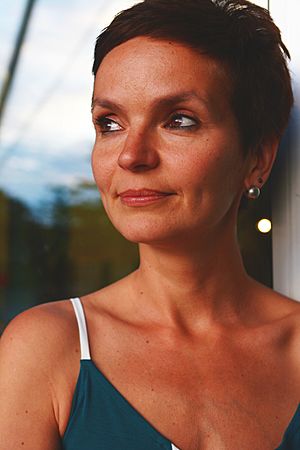Anaïs Barbeau-Lavalette facts for kids
Quick facts for kids
Anaïs Barbeau-Lavalette
|
|
|---|---|

Barbeau-Lavalette in 2015
|
|
| Born | 1979 (age 46–47) Montreal, Quebec, Canada
|
| Occupation | Novelist, film director, screenwriter |
| Parent(s) | Manon Barbeau Philippe Lavalette |
| Relatives | Marcel Barbeau (paternal grandfather) |
Anaïs Barbeau-Lavalette, born in 1979, is a talented Canadian writer and filmmaker from Quebec. She creates movies and books. Her films often feel very real and involve the people she films. Anaïs comes from a family of artists. Her mom, Manon Barbeau, is a filmmaker, and her dad, Philippe Lavalette, works with cameras for movies. Her grandfather, Marcel Barbeau, was also a famous artist.
When she was younger, Anaïs was a child actor. She appeared in TV shows like Le Club des 100 Watts and À nous deux!. Later, she started making documentary films. These include Les Petits princes des bidonvilles (2000) and Si j'avais un chapeau (2005). Her first feature film, The Ring, came out in 2007.
In 2010, she wrote her first novel, Je voudrais qu'on m'efface, which was later translated as Neighbourhood Watch. This book features some of the same characters as her film The Ring. Her second novel, La femme qui fuit (translated as Suzanne), was released in 2015. This book was inspired by the life of her grandmother, Suzanne Meloche, who was an artist. It became a best-seller and won many awards.
Anaïs Barbeau-Lavalette is well-known around the world for her award-winning 2012 film Inch'Allah.
Contents
Early Life and Education
Anaïs Barbeau-Lavalette was born on February 8, 1979, in Montreal, Canada. Her mother, Manon Barbeau, is a filmmaker, and her father, Philippe Lavalette, is a cinematographer. Her grandfather, Marcel Barbeau, was a famous Canadian artist. He was one of the first artists in Canada to create abstract art, which is art that doesn't show real-life objects.
When she was a young adult, Anaïs lived and studied in the West Bank area. In 2000, after making her first full-length documentary, Les Petits princes des bidonvilles, Anaïs went to the Université de Montréal. There, she studied International Studies. After that, she studied Film Production at the INIS. She also traveled to Ramallah, Palestine to attend Birzeit University.
Film Career
Anaïs Barbeau-Lavalette has made many different types of films, from documentaries to feature films and short movies.
Documentaries
Anaïs started her filmmaking journey by directing documentaries. After spending a year in Honduras, she directed Les Petits princes des bidonvilles (2000). This film followed young people from Honduras who were growing up in Montreal.
In 2002, Anaïs represented Canada in a special project called the United Nations Volunteers' Odyssey. She traveled around the world and made 15 short documentaries. These films were all about the theme of volunteerism, which means helping others.
When she returned, Anaïs directed more documentaries. These included Si j'avais un chapeau (2005), which showed the lives of children in four different countries. She also made Tap-Tap, a film that beautifully showed the Haitian community in Montreal.
Fiction Films
In 2007, Anaïs released her first fiction film, The Ring. Critics really liked this movie. Her second fiction film, Inch'Allah, released in 2012, became her most famous work.
In 2020, she directed Goddess of the Fireflies (La déesse des mouches à feu). This movie was based on a book by Geneviève Pettersen. In 2022, she released White Dog (Chien blanc). This film was an adaptation of a 1970 novel called White Dog by Romain Gary.
Short Films
Anaïs Barbeau-Lavalette has also created many short films. These films cover different styles and topics. During her time with the United Nation's Volunteers' Odyssey, she directed 15 short documentary films. She has continued to make short films throughout her career.
Some of her short films include Seven Hours Three Times A Year (2012), Ina Litovski (2012), and an 11-minute animated short film called Take Me (2014).
Music Videos
Anaïs Barbeau-Lavalette is also involved with Wapikoni Mobile, a project that helps Indigenous youth create films and music. Through this project, Anaïs has directed music videos for different musicians. These include Canadian singers Catherine Major and Thomas Hellman, and hip hop artists Samian and Dramatik.
Awards and Recognition
Anaïs Barbeau-Lavalette's films and books have won many awards. Her documentary Si j'avais un chapeau (2005) was nominated for "Best Social Documentary" in 2006.
Her feature film, Le Ring (2007), was very popular with critics. It was shown at important film festivals like the Pusan and Berlin film festivals in 2008. Le Ring also won international awards, including the New Talent Grand Prize and the Golden Lion Award at the Taipei Film Festival. It also received the Special Jury Award at the Vladivostok Film Festival in Russia and the Best Director Award at the Miradas Madrid Film Festival.
Anaïs is also an activist who cares about peace, human rights, and helping countries develop. In February 2013, she was named artist of the year by Les Artistes pour la paix. This is an organization in Montreal that celebrates artworks about peace. In the same month, her film Inch'Allah won the FIPRESCI Prize at the 2013 Berlin International Film Festival.
 | DeHart Hubbard |
 | Wilma Rudolph |
 | Jesse Owens |
 | Jackie Joyner-Kersee |
 | Major Taylor |

